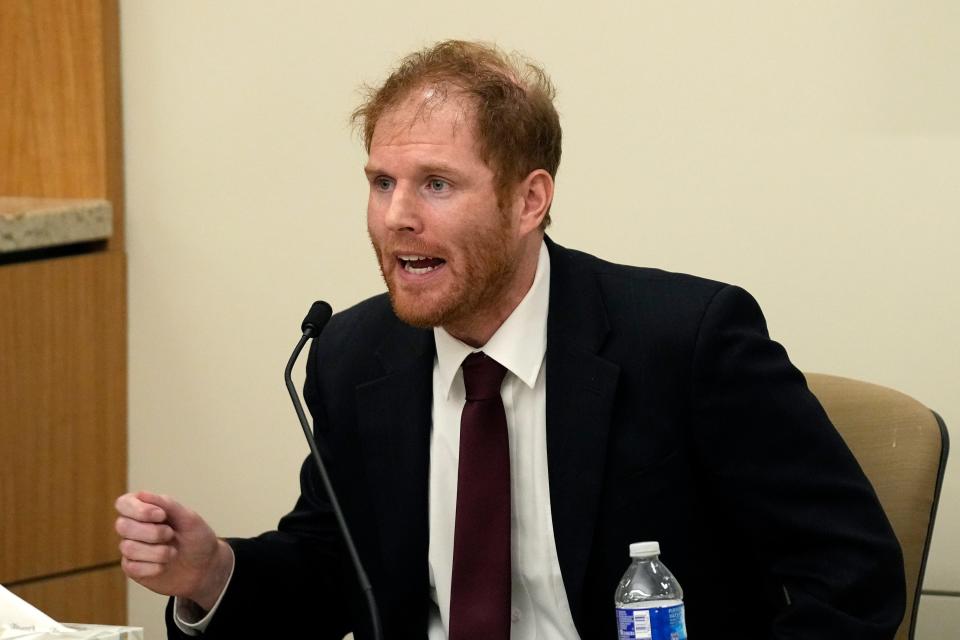Will a defamation case against Kari Lake go forward? Judge to decide soon
- Oops!Something went wrong.Please try again later.
A Maricopa County judge is expected to decide soon whether a defamation case against former gubernatorial and current U.S. Senate candidate Kari Lake will go forward.
That ruling could set a high-profile precedent on a recently revised state law intending to deter lawsuits that seek to censor or intimidate critics.
The lawsuit, filed in June by Maricopa County Recorder Stephen Richer, accuses Lake and her affiliates of spreading false information about Richer following the November 2022 election. He alleges that Lake knew, or should have known, the statements were false. Lake and Richer are both Republicans.

But Lake says Richer is seeking to silence her and other election integrity critics. She condemned his defamation suit against her while appearing at Turning Point USA's annual "AmericaFest" conference in Phoenix on Sunday.
Attorney Jen Wright argued in court on Tuesday that Lake's statements, while exaggerated, are ultimately based on "provable facts" and that Richer is subject to "harsh criticism" as a public official.
"There's nothing more protected than political speech directed at criticizing elected officials doing their public duties," she said. "It comes with the job Recorder Richer signed up for."
Cameron Kistler, an attorney for Richer, said "a reasonable audience member" would interpret Lake's comments as directly accusing Richer of intentionally sabotaging the 2022 election — which he did not do.
"The First Amendment gives defendants the right to criticize Stephen Richer's election administration, his political views and even his hair," Kistler said. "But the First Amendment does not give defendants the right to falsely and repeatedly accuse Stephen of committing specific unlawful acts."
No evidence of fraud has been discovered in either the 2020 or 2022 elections. Arizona's Supreme Court has dismissed Lake's challenges to the 2022 election, aside for one point related to voter signature verification that Lake is still appealing.
Maricopa County saw widespread printer issues on Election Day that didn't impact results, but led to lines and voter frustration. An analysis by The Arizona Republic found the troubled polling places were about evenly split between precincts going for Lake and her opponent, Democrat Katie Hobbs.
An independent review of the county's printer woes ultimately found that the issues were caused by the length and thickness of midterm ballots — not fraud or wrongdoing, as Lake and some other Republicans alleged.
Case could test Arizona's revised anti-SLAPP law
Lake and her attorneys filed two motions to dismiss the defamation case. One was filed under Arizona's anti-SLAPP law, originally passed in 2006 and revised last year. An Arizona court has yet to rule on the statute's new framework for establishing what defamation cases should be dismissed outright.
SLAPP stands for "strategic lawsuit against public participation," a meritless lawsuit that is brought to silence or intimidate someone who is speaking about a matter of public concern. In Arizona, the law allows for expedited dismissal of a lawsuit if it arises from a desire to deter the exercise of the rights of free speech and petition.
Lake's attorneys said Richer intended to chill Lake's speech by bringing a defamation lawsuit against her. They pointed to Richer's request for injunctive relief, a remedy that would restrain Lake from making certain statements about him.

Attorney Laurence Schwartztol, who represents Richer, said Lake's interpretation of the revised anti-SLAPP law would result in courts "fast-tracking the dismissal of every defamation case."
"The statute is not a defamation immunity law," he said.
Both sides left the courtroom without a ruling. Judge Jay Adleman said he is considering the arguments and will make a decision "in pretty short order."
What happens next?
Adleman could opt to dismiss the case under Lake's regular motion to dismiss, sidestepping the anti-SLAPP law.
But if he doesn't, he will need to determine how to interpret the new statute.
If Adleman determines that Richer's suit was substantially motivated to deter Lake's free and lawful speech, he could dismiss the case and award Lake attorney fees.
If he rules Lake's motion to dismiss is solely intended to cause delay, he could award attorney fees to Richer.
The case could then proceed to the next stage in court. Known as discovery, it's a formal process of exchanging information between attorneys about witnesses and evidence that could be presented at trial.
Lake's attorneys asked Adleman to consider delaying that step. Wright said Richer's lawyers are already "actively engaging" Lake with discovery requests.
Sasha Hupka covers county government and election administration for The Arizona Republic. Do you have a tip to share on elections or voting? Reach her at sasha.hupka@arizonarepublic.com. Follow her on X, formerly Twitter: @SashaHupka. Follow her on Instagram or Threads: @sashahupkasnaps.
This article originally appeared on Arizona Republic: Judge to say if defamation case against Kari Lake goes forward

